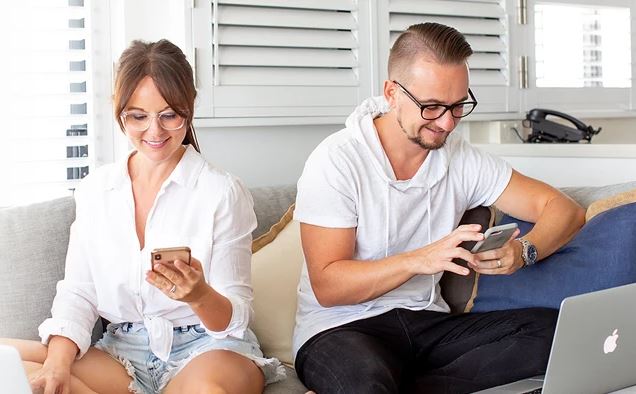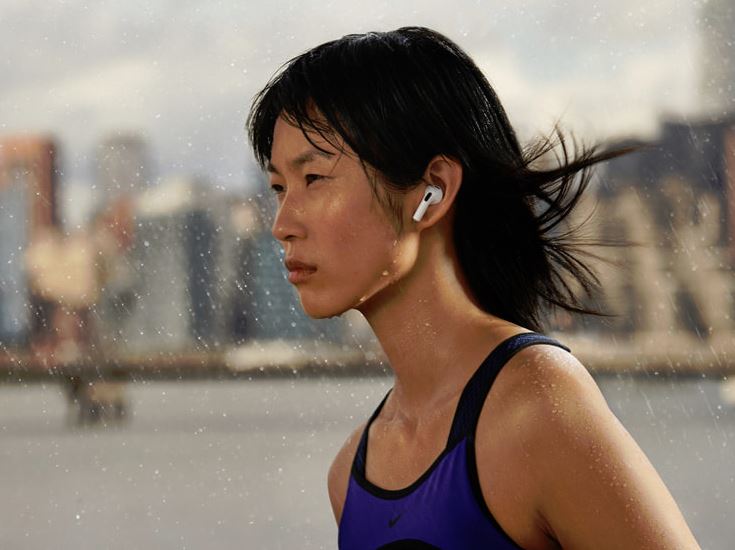We hear a lot about blue light these days and how it’s not good for us but is it really as serious as it’s made out to be? If you take a look at the research, there is a lot to back up the claims about artificial blue light negative effects. Harvard University research has shown exposure to blue light after dark disrupts our sleep and increases our risk of a range of illnesses including cancer. So how do we make sure we don’t get so much blue light?
It’s not quite that simple. For a start – the sun emits natural blue light in balance with all the other colours in the spectrum during the day – and it’s actually good for you. This natural blue light is essential for regulating your sleep, wake cycles and your body clock. At night, when there’s no natural blue light, this tells our brain its night-time and our brain secretes melatonin (the sleep hormone) so we feel sleepy and eventually, sends us to sleep.
But the blue light emanating from your digital devices – phone, computer, TV and even your light bulbs – doesn’t do this for you. This light has far more blue light in it than other colours on the spectrum so when you look at a digital device, your eyes are receiving too much unbalanced blue light.

This blue light penetrates the eye right through to the retina and, over the course of a day, will often cause digital eyestrain. Over a longer period this light can aggravate other conditions, including macular degeneration.

What is digital eyestrain?
Digital eyestrain is characterised by dry itchy eyes, headaches and fatigue. In winter, when the sun doesn’t come out as much and we don’t get as much natural light, this can find us using more artificial light sources and because the extra blue light raises our stress hormones such as cortisol, we can also get SAD (Seasonal Affective Disorder) or higher levels of stress, anxiety and depression.
What happens when the sun goes down
In today’s world, the sun may go down but we still keep checking our mobile phones, watching our TV, working on our computer – and we turn on our house lights. All of these devices continue to emanate blue light.
This blue light sends a message to the brain telling us its day time, so we don’t need to relax or feel sleepy. Harvard University research has shown exposure to blue and green light after dark disrupts our sleep and increases our risk of type-2 diabetes, depression, heart disease, anxiety and cancer.
How can you avoid too much blue light at the wrong time?
To make sure you don’t receive too much artificial blue light it’s a good idea to wear glasses which filter out the artificial blue light from digital devices.
For exposure during the day, you can ask your optometrist to add a blue light filter to your glasses when you order them and this will filter out some of the blue light when you’re using your computer during the day. But if you’re after more choice and some higher grades of blue-light blocking glasses, an Australian company called BLUblox has specialised in this area.

blue-light blocking glasses that were stylish at the same time.
BLUblox has gone into light management in depth and they offer three different ranges of glasses plus glasses for kids:
- BluLite: Computer glasses which are clear and filter out artificial blue light for use during the day.
- SummerGlo: Mood booster glasses with a light-yellow lens which blocks artificial blue light but gives you a brighter view.
- Sleep+: These have a red lens which blocks both artificial blue and green light from your digital devices at night, allowing your brain to still get the message to produce melatonin for sleep.
- Kids: A child’s retina is over 100% more sensitive to blue light than an adult’s according to the American Optometric Association studies, so it’s important for young people to use blue-blocking glasses as well, available in non-prescription and prescription glasses.
We asked Katie Mant, Creative Director at BLUblox, why she and her partner, Andy Mant, set up BLUblox and went into the area of managing light?
“I remember the day Andy bought his first pair of blue blockers a few years back from a well-known online platform,” says Katie. “I thought he was mad wearing orange safety goggles. They were hideous. There was no way I was jumping on the blue-blocker band wagon whilst they looked like that. I would feel so uncomfortable in public wearing them.”
As time went on, Katie could see Andy was reaping benefits from his “orange safety goggles” and because there weren’t many other options available, the two of them decided it was important that people could buy products to help them manage their light intake and improve their health – but at the same time, still look stylish.

at their company, BLUblox.
So they developed a full range of glasses in the four categories listed above. But Katie points out: “Not all computer glasses are created equal. Cheaper pairs will only focus on violet light which isn’t present in computers. Make sure you opt for a brand whose computer glasses actually filter blue light.”
“Our clear lenses are part of our Computer Glasses collection and these anti blue light glasses filter down harmful article blue light across the whole blue light spectrum. Our unique BluLite technology provides the most effective blue light protection making them the best computer glasses for daytime use,” she adds.
“These glasses have an anti-glare lens which provides you with crystal clear vision with minimal colour distortion,” she says. “The transparency of the clear glasses lets in the good blue light responsible for alertness, mood, rain activity and optimal health whilst filtering out the harmful damaging blue light that leads to digital eyestrain, headaches and macular degeneration. The lenses are also smudge proof, water, scratch and dust resistant.”
BLUblox Sleep+ range can help induce a more restful sleep
Katie says: “The high quality therapeutic die coated on the lenses of our Sleep+ range produces a rich red lens that when worn two to three hours before bed, helps induce sleep through allowing the production of melatonin whilst in an artificially lit environment and promotes a relaxed and restful sleep.”
“These lenses have many uses including aiding a better night’s sleep, assisting with insomnia, improving ADHD, aiding with sports performance recovery as well as aiding the prevention of macular degeneration,” she adds.
“Our Sleep+ red lenses are also a great tool for jet lag as they help re-align the body clock. There is no need to switch off the TV, your smart phone or switch off the lights when you use the Sleep+ lens after dark,” says Mant.
BLUblox glasses are made in Australian under optics lab conditions. For more information, take a look here.






